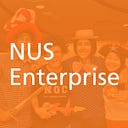The catch-up on Kopi Chat Deep Dive: AI in Healthtech
Contributed by Chen Yi Ting
Through the use of complex algorithms and software which emulate human cognitive processes, artificial intelligence (AI) opens up a plethora of possibilities in the healthtech industry. After rounds of repeated testing, AI-powered programmes and machines are able to provide in-depth analyses and assist clinicians or nurses in areas such as disease diagnosis, patient monitoring and use of anesthetics.
In our Kopi Chat Deep Dive panel on 14 August, we discussed the topic in depth with our specially invited panellists and moderator, Mayank Gurnani, Associate Director of the NUS Industry Liaison Office.
Our panelists are:
● Aneesh Sathe, CEO & Co-founder of Qritive. Qritive’s product, Pantheon, is a digital platform which uses AI solutions to analyse microscopic images of tissues, leading to higher accuracy of cancer diagnosis, lowered costs and improved patient outcomes.
● Gurpreet Singh ,Senior Research Fellow of A*STAR and Founder of Respiree, which provides targeted predictions and diagnosis of cardio-respiratory diseases using a combination of AI and advanced breath-cardio sensors.
● Seemant Jauhari , Managing Partner of HealthXCapital, a Singapore based early stage venture firm which invests in healthcare startups and assists them in commercialisation by tapping into the rapidly growing healthcare opportunity in emerging Asia.
Here are five nuggets of insight gleaned from the session.
- AI is essentially high-powered statistics.
AI associates itself with deep learning. However, at its core, AI refers to high-powered statistics which requires data points. Humans also have internalised statistics which include exceptions to the norm. An example cited by Aneesh was that you would not expect to see a wild pig crossing the road but it does happen in Singapore. As such, the system needs to be able to digest huge amounts of data and give outputs which are beyond simple “yes” and “no” answers.
2. AI improves workflow operations and generates greater productivity in the medical sector.
According to Gurpreet, AI can provide greater accuracy to assist healthcare workers in their decision-making process. Mathematical models which have been generated through AI can be used to build predictive algorithms that can be more accurate in terms of sensitivity and specificity. This helps clinicians and nurses confirm patient physiological data and gives actionable insights regardless of the distance between the clinician and patient thus providing greater accessibility and efficiency.
3. There is a global upward trend in adoption of AI technology.
Compared to the last five years, Seemant notes an increasing level of openness and acceptance towards AI start-ups across governments. In particular, Zebra Medical Vision, is the first AI start-up in medical imaging to receive US Food and Drug Administration (FDA) clearance for population health solution and recently received its sixth clearance for an imaging technology that can detect early signs of breast cancer in mammograms. (Read: https://www.biospace.com/article/releases/zebra-medical-vision-secures-its-first-fda-clearance-in-oncology-boosting-early-detection-of-breast-cancer-in-mammograms-/?keywords=zebra)
4. AI industry still faces challenges in terms of existing mindsets.
With several years of experience in the AI industry under his belt, Seemant notes there is an underlying fear that AI may replace jobs or place lives at risk. However, he assures that AI is going to be complementary and will enhance our quality of life, similar to computers. Furthermore, with proper enforcement of regulations and routine checks by humans, risks can be lowered, similarly for vehicles such as buses and airplanes.
5. The sky is the limit for AI.
The panelists are optimistic about the future of AI and the benefits AI can bring. Gurpreet encourages startups to conduct R&D for multiple types of people and geographies while Aneesh emphasises the need to understand market fit and to add value by finding a difficult problem to solve. Lastly, Seemant highlighted that AI in healthcare is still very rudimentary. There is a lot to learn and train because data, especially in the developing world where 60–70% of the world lives, is very sporadic.
To find out more about the panellists or to join their teams, head to:
● Qritive: https://www.qritive.com/
● Respiree: http://www.respiree.com/
● HealthXCapital: https://www.healthxcapital.com/
If you are keen on entrepreneurship and technology, check out similar events on NUS Enterprise website (https://enterprise.nus.edu.sg/).
